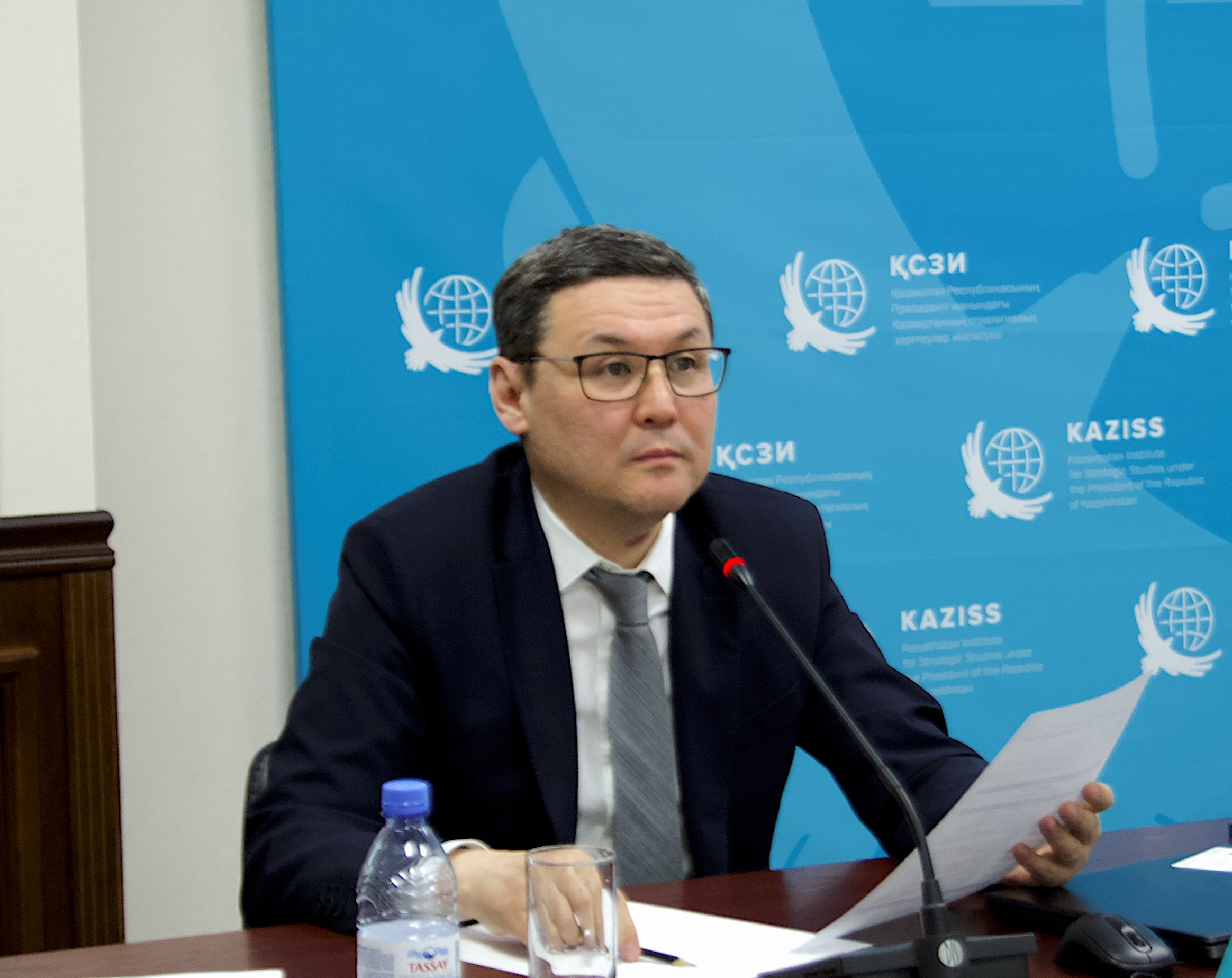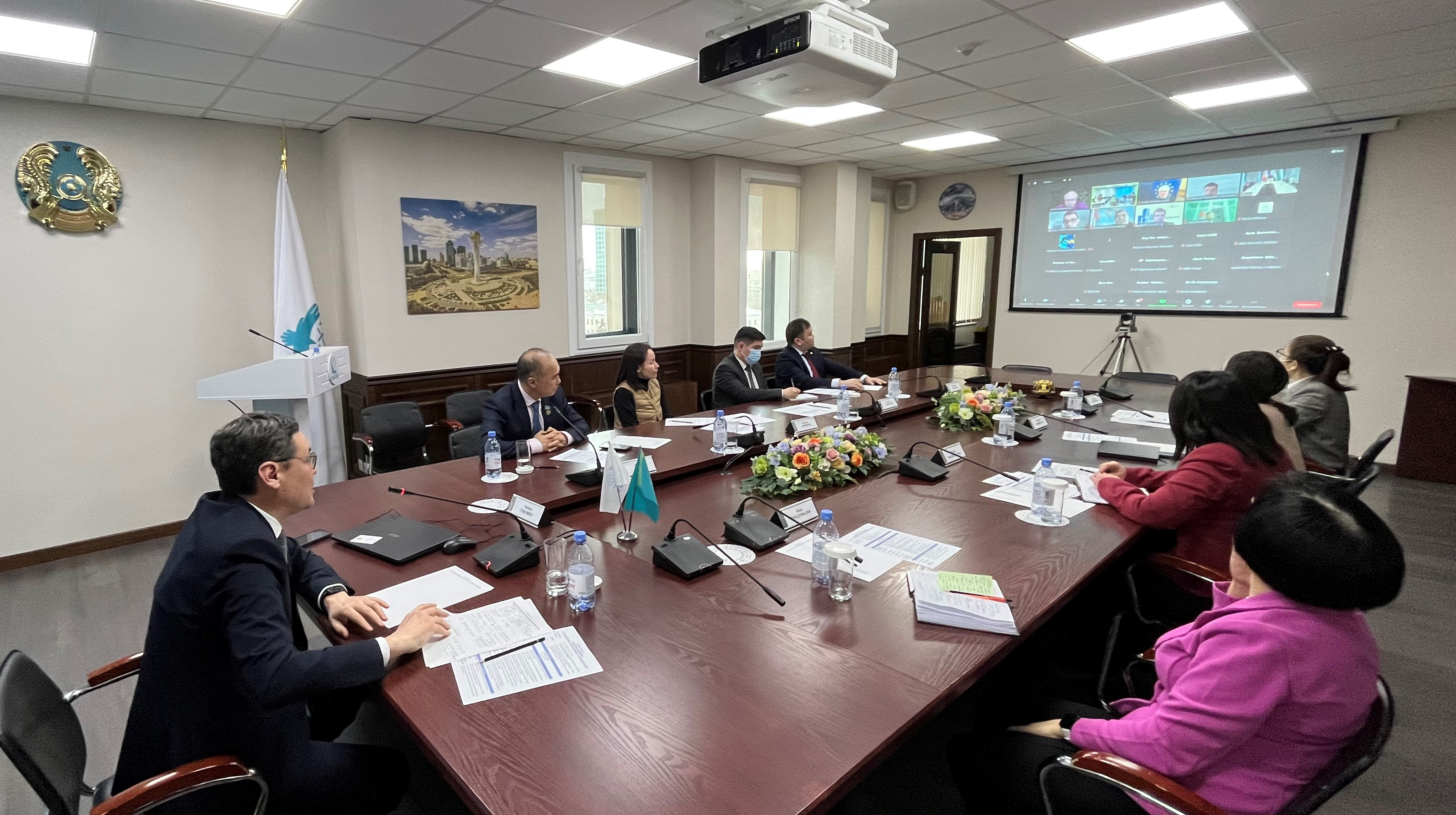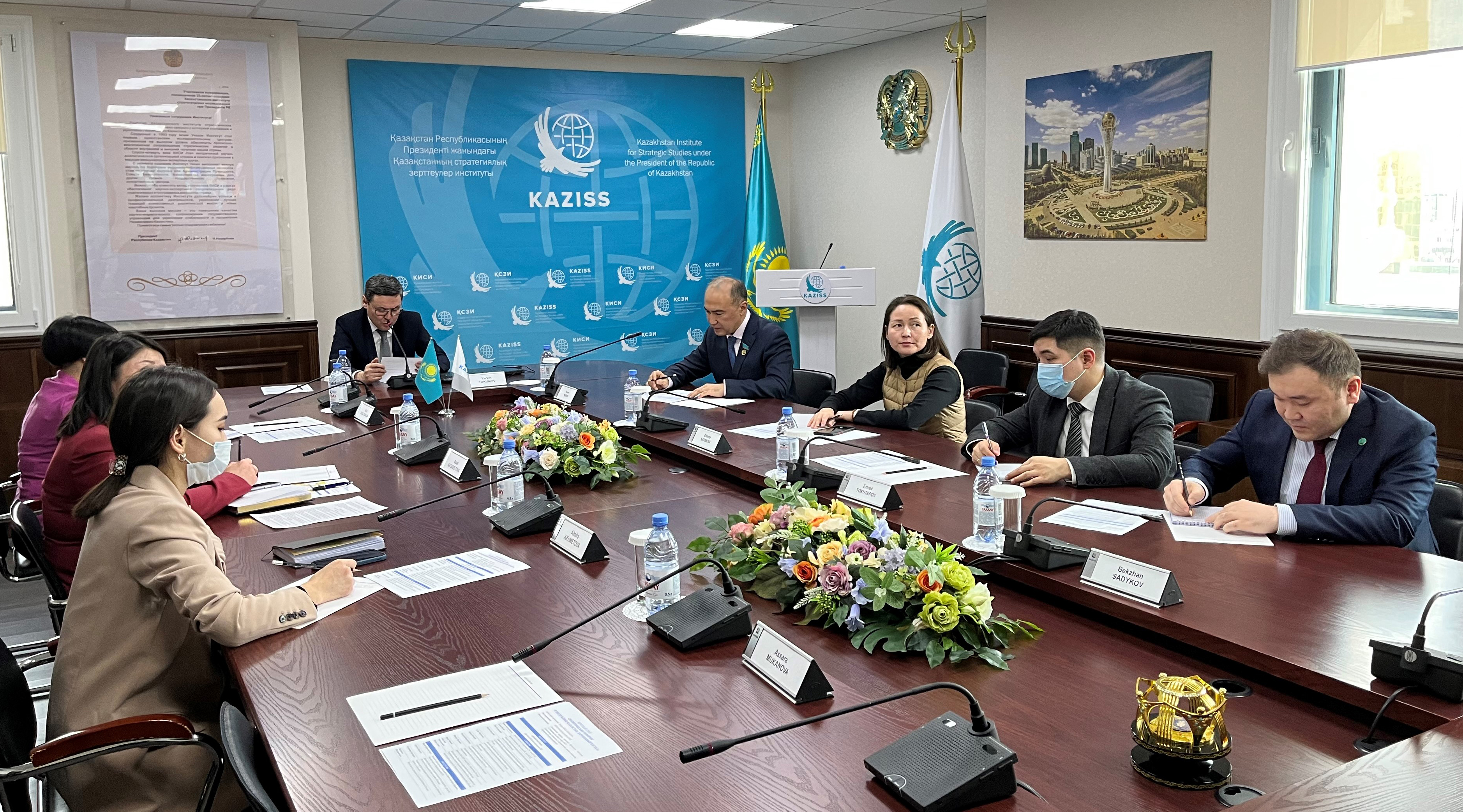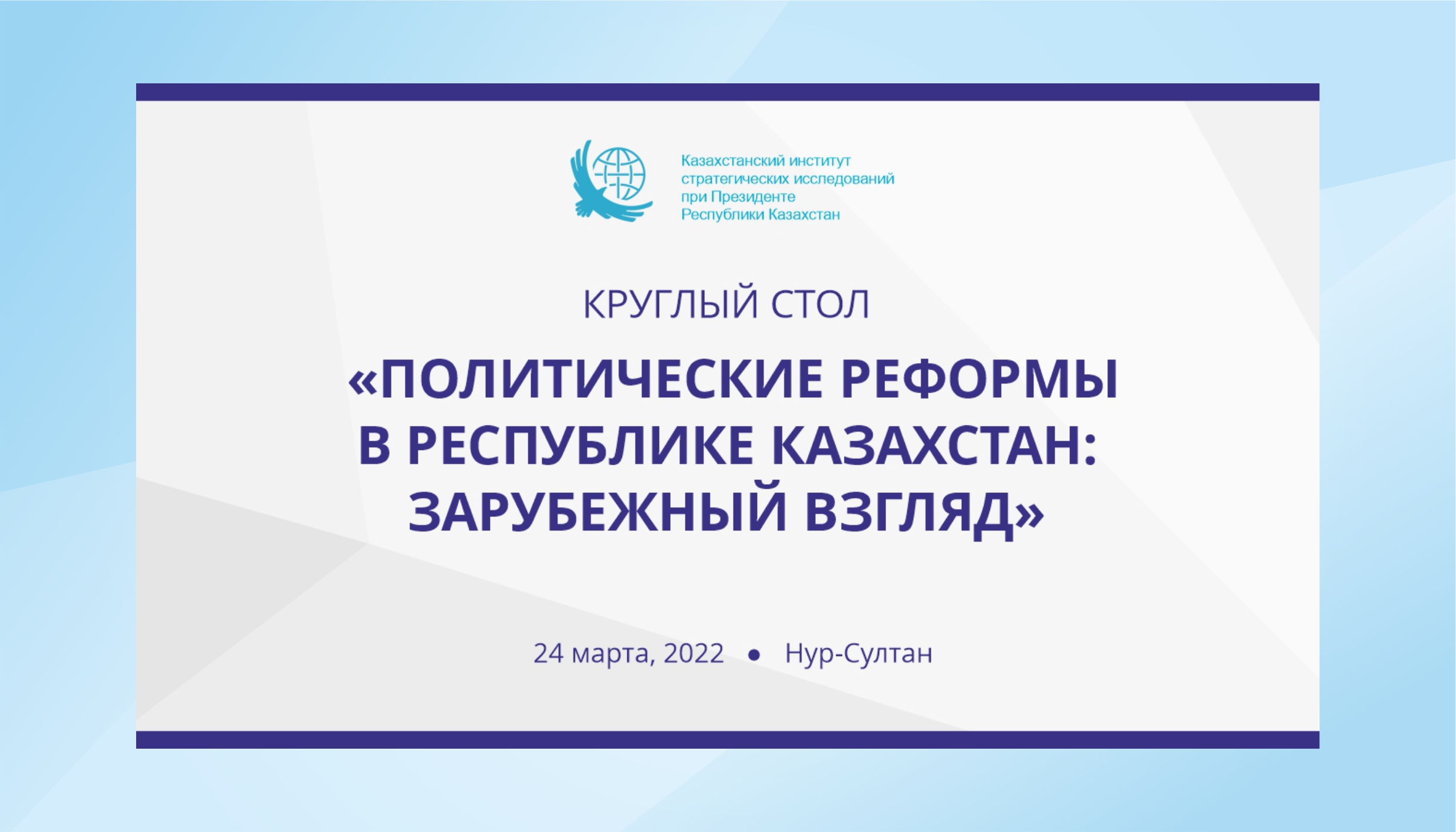On March 24, 2022, a round table was held at the KazISS under the President of the Republic of Kazakhstan on the topic "Political Reforms: Foreign Views". The key task of this event was the exchange of views on political reforms, which were voiced by the Head of State in the last Address.
Foreign and Kazakh experts discussed the current state and trends in the transformation of the institutions of power in Kazakhstan, the political, social and economic significance of the President's initiatives, as well as the prospects for the development of civil society institutions.

The round table was moderated by KazISS Director Yerkin Tukumov, who noted that without political modernization, neither effective economic development, nor the building of civil society, nor, ultimately, the preservation of our sovereignty and independence is possible.
Deputy of the Majilis of the Parliament of the Republic of Kazakhstan, member of the NCPT Kanat Nurov, addressing the participants of the round table, said that the sooner we move on to these changes, the better it will be for all Kazakhstanis. “We will be better aware of their significance for a completely new political system - the transition from a super-presidential republic to a presidential one,” the deputy noted.
Foreign experts also spoke about the new political reforms of the President. According to the expert of the Institute for Asian and Global Studies named after M. Boym, Jerzy Olendzki (Poland), remodeling the presidential system of power, changes in the electoral system and assistance in the creation of political parties is a decisive step towards deepening the democratization of the country.
Andrey Kazantsev (Russia), Director of the Center for Research on Central Asia and Afghanistan at the Institute for International Studies at MGIMO, noted that we are dealing with a very interesting experiment - the creation of New Kazakhstan. According to the expert, the rejection of the super-presidential system will strengthen the feedback from the population and increase the citizens' trust in the government.
Sun Zhuangzhi, Director of the Institute of Russia, Eastern Europe and Central Asia of the Chinese Academy of Social Sciences, highlighted the following characteristics of the political reform of K.K. Tokayev: the creation of a perfect Government, the creation of a strong Parliament, the creation of a rule of law state, the creation of a system of social protection.
“The announced reforms will undoubtedly have a positive impact on the lives of Kazakhstanis,” said Anvar Nasirov (Uzbekistan), director of the International Institute of Central Asia. He also noted that political reforms will help create a new political culture that will strengthen the interaction between government and citizens.
Aleksey Malashenko (Russia), Chief Researcher at the Institute of World Economy and International Relations of the Russian Academy of Sciences, paid special attention to the decisiveness of the President. K.K. Tokayev is very decisive, sincere and intelligent, which is a rarity among politicians. “After the January events, he quickly began to carry out the reform, although it was possible to wait, look around, but he takes risks and does the right thing. He has matured, the society has also matured,” he stressed.
According to Azerbaijani political scientist, expert of the Valdai Club Farhad Mammadov (Azerbaijan), the lack of alternatives to reforms is an important element of the entire line of the presidency of Kassym-Jomart Kemelevich Tokayev. The expert noted that the President demonstrates by personal example where acceleration is needed, where you need to think, where certain time is provided.
“The initiative voiced within the framework of the President's Address to the people is systematic and progressive. A significant part is the result of the work of the NCPT and individual requests from public activists,” emphasized Daria Chizhova (Russia), Director of the IAC of Moscow State University named after M.V. Lomonosov.
Chairman of the National Association of Political Scientists of Tajikistan, Associate Professor of the Tajik National University Abdugani Mamadazimov (Tajikistan) noted that at the SCO and CSTO summit in Dushanbe, the Head of State said: “We do not need “big games” in Eurasia, we need a “big breakthrough” in order to build a peaceful , a secure and sustainable future for all”. Therefore, Abdugani Mamadazimov perceives this Message as the beginning of this very “big breakthrough” of Kazakhstan, which is still able to involve other countries of Central Asia.
Igor Savin (Russia), Head of the Central Asian Sector of the Institute of Oriental Studies of the Russian Academy of Sciences, emphasized that the transition to local self-government will allow more effective resolution of issues of ethnic minorities. According to him, Kazakhstan has always adhered to the line of the absence of politicization of ethnicity, preferring to look at ethnicity as one of the dimensions of society's social agenda. “Kazakhstan's readiness to implement a large-scale political reform program is a signal to other states that the country intends to focus on domestic issues. The smooth and gradual nature of the reforms shows the seriousness of the intentions of the country's leadership. The tone of the Address is business-like, and this gives confidence that the expectations from the reforms will be met,” the expert noted.
Political figure, founder of the German Green Party, former MEP Frank Schwalba-Hot (EU) wished the Ulttyk Kuryltai Public Trust Council to achieve its goals and become a model for many other countries. He also wished that Kurultai was not only a political council, but also represented the interests of ordinary people, ordinary people.
“President K.K. Tokayev, from the beginning of his presidency, initiated the transition to serious political reforms that covered every sector of the Kazakhstani political system. It is worth noting that he always speaks very openly about the effectiveness of the political system. And this time in his Message he became even more open. He openly stated that the opinion of the people is important to him. We can say that the Message was a response to all the demands of society,” concluded Svante Cornell (Sweden), Director of the Institute for Security Policy and Development, Director of the Institute of Central Asia and the Caucasus.














